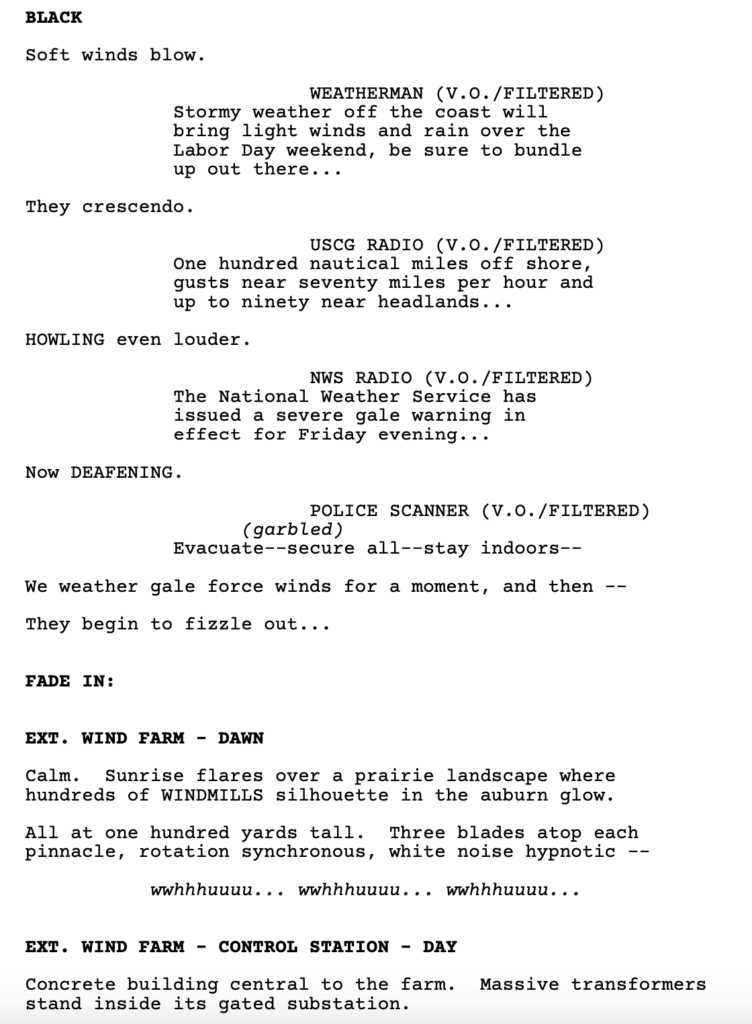Today’s post comes with a fun twist. One of the loglines is AI generated. See if you can guess which one!

Okay, it’s time for one of my favorite segments here at Scriptshadow – “Why Didn’t My Script Get Picked?”
Ever wonder why your script didn’t make the cut? You’re going to find out exactly why, as I provide you with 11 scripts that didn’t make this past Friday’s High Concept Showdown, as well as why they didn’t make it.
Just a reminder that, in the new year, I’ll be pitting five loglines against each other every month. You will decide which one wins, and, in the process, which script I review the following week. Therefore, just because you didn’t make High Concept Showdown, that doesn’t mean your submission is dead in the water. You can re-submit your high concept script, or any script for that matter, and will have a dozen shots next year to get that spotlight review.
Oh, and there’s a little TWIST to today’s post. I’m including an AI-generated logline. So here’s what I want you to do. I want everyone in the comments to vote for their FAVORITE logline here as well as the logline they think is AI generated. That’s fine if they’re one and the same. I’m going to be highly worried if an AI logline wins today’s post because that, of course, means, Skynet is coming. (P.S. – the AI script link is a dummy script. So make your votes and guesses BEFORE you download any the screenplays).
Enjoy!
Title: The Fire Inside
Genre: Sci-fi/Fantasy, Historical Fiction, Horror, Drama
Logline: After dead Confederate soldiers come back to life and attack during a Civil War battle, a Union soldier returns to his Georgia home looking for answers – and finding more questions.
Reason It Didn’t Get Picked: Whenever I see more than two genres under the genre designation, I get really worried. Because all of the scripts I read that do this are bad. And this entry has four, one of which is a dual-genre (sci-fi/fantasy). So actually, five. A movie just can’t hold five genres. So I already know it’s going be all over the place. As for the idea, it does have some ‘high concept’ DNA in it. Confederate soldiers coming back to life is good. But another logline-killer is the tapered-off vague ending that doesn’t really tell us anything. “…home looking for answers. – and finding more questions.” You need to tell us what actually happens. Not hint at questions and answers. There are going to be questions and answers in every script, hopefully.
Title: Southsiders
Genre: Adventure
Logline: After his treasure hunting father is arrested for a crime he says he didn’t commit, his twelve-year-old son and his friends search the South Side of Chicago to find Al Capone’s hidden fortune and clear his name… It’s in the vein of GOONIES, DOPE and NATIONAL TREASURE.
Reason It Didn’t Get Picked: This one almost made the cut. As a Chicagoan, I’ve always been convinced that Capone hid a bunch of his money in the suburban houses where all his cronies lived. The issue with this logline is that the first half doesn’t organically connect with the second half. A father is arrested for a crime. So, to clear his name, you have to find Al Capone’s treasure? How does that work? Does the Chicago DA give away free get-out-of-jail-free cards for anyone who finds Capone’s treasure? With the Goonies, the connection was more organic. The need to find the treasure was to stave off the foreclosures of their family homes so a country club can’t buy them out. Still, this one finished Top 10-15 for me. I’d be curious to hear what all of you think of it.
Title: ACTION REPLAY
Genre: Sci-fi/Action/Comedy
Logline: When the world’s Most Wanted Criminal hijacks a TIME MACHINE a lowly technician keeps sending himself back to save the day – but more and more of his past, present and future selves just keep adding to the chaos…
Reason It Didn’t Get Picked: This is a good example of the importance of getting feedback on your loglines. Cause, if you glance through this quickly, it feels high concept. It feels like a movie. But when you read through the logline with a detailed eye, it’s harder to understand. Before we get to that, though. Stop with the unnecessary capitalization. I don’t understand why writers do this. “Most Wanted Criminal” should not be capitalized. If I see unnecessary capitalization? That’s pretty much a guarantee I’m not reading the script. But, anyway, we’ve got a criminal who hijacks a time machine. And we’ve got a technician who wants to stop him. So he goes back in time to stop him, I guess. But… how can he go back in time to stop him if the criminal already took the time machine? It doesn’t quite make sense.
Title: Vampire in Silicon Valley
Genre: Comedy
Logline: In the high-tech world of Silicon Valley, a young and successful entrepreneur discovers that he is a vampire. As he struggles to maintain his humanity while navigating the cutthroat world of tech startups, he must keep his true identity hidden while dealing with the challenges of being a vampire in the modern age. With the help of his quirky and eccentric team, he must find a way to use his vampire powers to succeed in the competitive world of tech while also staying true to himself.
Reason It Didn’t Get Picked: I loved this title but there’s something about the way the logline is presented that tells me the screenplay is going to be extremely generic. The phrase, “quirky and eccentric team,” in particular, was a logline killer in my opinion. Writing loglines is a balance between getting the basic idea across, yet still peppering it with just the right amount of detail so it feels like the script is going to be unique in some way.
Title: Hollywood Ending
Genre: Horror-comedy
Logline: After a zombie outbreak at a swanky Hollywood party the lowly Caterers realize the biggest stars in the world are suddenly trying to eat them.
Reason It Didn’t Get Picked: This is what I’d refer to as an “almost idea.” It certainly has components of a high concept idea. But there’s something not clever enough about it. It just feels kind of surface-level. I don’t even think the right people are turning into zombies. It would probably be better if the stars were getting attacked. I think audiences would enjoy that more. Even still, I tend to resist movie ideas with giant stars playing themselves only because it’s so insanely hard to get huge actors to do this. And to get multiple movie stars to agree to it is even harder. Also, another unnecessary capitalization (Caterers)!
Title: LANDED
Genre: R rated Comedy
Logline: A freshman makes a promise not to use any cellphone during her first day at college, but when she must make a phone call, the result is a wild and unexpected adventure following a map to the campus’s few landlines.
Reason It Didn’t Get Picked: The reason I didn’t pick this one is pretty simple. I just didn’t see any stakes in the story. A big reason why that comedy, “Tag,” from several years back, was DOA at the box office, was because nobody cared if these guys kept tagging each other. There were no stakes. Same issue here. Who cares if someone needs to make a phone call or not? You might *stress on might* be able to make a short of that. But it’s not even like somebody stops her. This is a promise she made to herself. Okay, then, break your promise. Problem solved. I’m just not understanding this premise. Also, the title doesn’t match the plot.
Title: ‘Zero at the Bone’
Genre: Mystery Thriller
Logline: A troubled detective on leave is thrust into a secret Anarchist community seeking help to investigate the first ever murders behind their gate.
Reason It Didn’t Get Picked: We’ve got yet another unnecessary capitalization. This is becoming an epidemic. We’ve also got single quotes around the title. I don’t know why anybody does that. People, you have to understand that managers and agents and producers don’t have time. You give them an easy reason to say no, they’re going to take it. These are small things that you can fix with a little feedback. So many writers are shooting themselves in the foot, here. It’s frustrating to watch. As for the concept, there isn’t enough irony in it. Anarchists bring about anarchy. Therefore, it makes total sense that someone within that community would kill someone. Why not set the murder in an Orthodox Jewish community, where the murder rate is 1/1000th the rest of the country? Now you’ve got irony in your idea.
Title: Don’t Let The Fire Die
Genre: High Concept Horror
Logline: On a wilderness, glamping adventure, a dysfunctional man and his dysfunctional friends must fight to keep their fires lit as they are hunted by primeval predators that are afraid of fire.
Reason It Didn’t Get Picked: First of all, props to Morgan for ZERO unnecessary capitalization in his logline. Thank goodness. Couple of reasons this one didn’t make the cut. One, I didn’t know what glamping was. I had to look it up. That’s usually not a good thing since readers don’t want to do your work for you. They just want to know what they’re reading. So most won’t look that word up like I did. I don’t like the use of “dysfunctional” twice. That tells me the writer didn’t do a ton of work on the logline. Just say, “a dysfunctional group of friends.” But the biggest issue here is that there’s no cleverness or irony to the setup. They’re supposedly hunted by these special predators that are afraid of fire. Every predator is afraid of fire. The “strange attractor” in this idea isn’t strange enough, in my opinion.
Title: Time’s Past
Genre: Sci-Fi/Thriller
Logline:A special agent is brought on to a top secret programme where they use a device to turn back time in order to stop crime before it happens, but finds herself in a predicament when one criminal they are chasing seems to know about the device and a dark secret behind it
Reason It Didn’t Get Picked: If you’re keen, you’re starting to see what I see, just on a smaller scale. Which is that I get all these submissions that feel like they SHOULD be big, and yet they don’t have that clarity or that special attractor, or that irony, or that well-thought-out plot direction that truly elevates them into high concept territory. Turning back time to stop crime is a big fun sci-fi idea. But then the logline limps towards the finish line with this vagary regarding a criminal who knows a dark secret behind the device. Nobody cares about that. They care about the fun part. Not the much smaller detail of a ‘dark secret.’ And, if the dark secret is really cool, it needs to be in the logline. You’re trying to get people to read your script here. Tell them what your movie is about. Don’t be cryptic.
Title: Southern Belle
Genre: Action / Comedy
Logline: A government assassin uses her undercover identity as a beauty queen to travel the South until she bumps into a rival assassin… who turns out to be her mother.
Reason It Didn’t Get Picked: This idea just felt dated to me, that’s all. It felt like a script that could’ve been written in 1998. Does that mean you can’t draw inspiration from older movies, like Miss Congeniality? No. But the line between a fresh take on an old idea and just plain dated is blurry. So it’s a risk. Also, the addition of the mother feels like a slightly different movie. I’m not convinced it was needed.
Title: TIS THE SEASON
Genre: Christmas action thriller
Logline: An ex-CIA agent temporarily paralyzes Santa Claus after mistaking him for assassins breaking into his house. When the real assassins show up, the agent must get Santa to safety, evade the assassins . . . and deliver a f*ck ton of toys. It’s The Santa Clause meets My Spy meets Guardians of the Galaxy.
Reason It Didn’t Get Picked: I’m not a fan of violent Christmas movies. I say this to remind every writer here that there’s an element of subjectivity with every script you send out there. Obviously, Violent Night did really well this past weekend. So there’s a market out there for this kind of idea. But it’s just not for me. Which is why you never want to label your script good or bad based on a single opinion. Get a bunch of opinions. That’s where you find if you’ve got something good or not.
Title: Immaculate Nation
Genre: Sci-Fi/Action
Logline: In a nation of clones, where natural reproduction is punishable by death, a disgraced Enforcer from the Reproductive Crimes Bureau falls for a woman leading a free-breeding revolution.
Reason It Didn’t Get Picked: Something about this idea feels too familiar to me. It feels like a garden-variety Young Adult Sci-Fi Setup circa 2010. It feels too similar to Handmaid’s Tale. And cloning is a fairly dated sci-fi concept. From 1997-2005, every single spec had clones. So whenever I see that word, I feel immediate resistance. For me, at least, there isn’t that singular variable in this idea that really helps the concept stand out.
Look, movie ideas are hard. They’re like pop songs. They seem so easy when you hear them. But there’s real art and craftsmanship to constructing an exciting well-thought-out movie concept. It’s why I tell people, get logline reactions from your friends BEFORE you write your script, not after. I know screenwriters are all stubborn and are going to write what they wanna write at the end of the day. And I get that. I’m like that too. But, at the very least, you can identify if you’ve got a true stinker on your hands before it’s too late.
If you’re interested in getting a logline consultation from me, they’re $25 and they include a 150-200 word analysis, a 1-10 rating for both concept and logline construction, and a logline rewrite. If you want a more involved process where we discuss in depth what you’re trying to do with the logline and how to get the most out of it – I offer that as well. E-mail me at carsonreeves1@gmail.com and we’ll get started right away!
A shocking Christmas miracle. An IMPRESSIVE script review before the end of 2022!
Genre: Drama/Comedy
Premise: A unique young woman enters a hobbyhorse dance competition that she’s way too old for while dealing with her mother’s cancer struggle.
About: Lauren Meyering has made a few short films. This script finished with 7 votes on the 2020 Black List. Script link is at the bottom of the review if you want to read the script first.
Writer: Lauren Meyering (story by Mackenzie Breeden & Rachael Moton)
Details: 103 pages
 No idea who would play this role so I’m going to put Haley Lu Richardson down for now!
No idea who would play this role so I’m going to put Haley Lu Richardson down for now!
I’ve seen plenty of gender-swapping in the last five years.
I’ve seen John Wick get gender-swapped, Lethal Weapon get gender-swapped, I’ve seen Thor and Iron Man get gender-swapped, I saw All The President’s Men just get gender-swapped.
But never, in my wildest dreams, did I ever think that they would gender-swap Napoleon Dynamite. That came out of left field, did a detour in the dugout, quietly hid inside the mascot’s costume, before stripping down and singing God Bless America on the pitching mound.
We are watching something truly unique here.
And I’m about to find out if it’s any good.
Margarita, 26, is different. She’s got giant red unruly hair. She loves horses way too much. And she doesn’t have a filter. She says whatever she wants whenever she wants. Because she’s also socially unaware, she tends to make people uncomfortable. Which is why she doesn’t have a job and lives with her mom.
The problem is her mother, Sandy, has cancer. And Sandy’s worried that if she leaves this great green earth anytime soon, Margarita is not going to know how to take care of herself. So she encourages Margarita to get a job, which she surprisingly does (at a Halloween store).
Beaming from the confidence her newfound employment brings, Margarita joins a dance troupe of prepubescent girls who are currently working on a hobbyhorse dance. Yes, that means dancing with one of those stick horse things, something we all used to have as children. Neeeeeiiiighhhh!
When the dance coach announces a hobbyhorse competition at the local high school at the end of the month, Margarita throws everything she’s got into her routine. What she doesn’t know (major spoiler) is that her mom has just been told that the cancer is spreading. As Sandy builds up the courage to tell her daughter the grim news, Margarita readies herself for her big shining moment.
I was just talking to a professional writer and he taught me a new term I was unaware of: Protagonitis. Protagonitis is the act of every character in your movie being interesting EXCEPT YOUR PROTAGONIST. This happens because protagonists need to ground the film. Their job is to stabilize the movie so that all the other characters can fly. Unfortunately, this often leads to your protagonist being the weakest character in the story.
I can confidently say that this is NOT the case with Horsegirl.
Horsegirl owns this script. She’s easily one of the best written characters of the year. She could even be one of the best written characters I’ve come across. There may be some recency bias in that assessment but read this script and try not to remember this character for the rest of your life.
I mean check out this introduction.
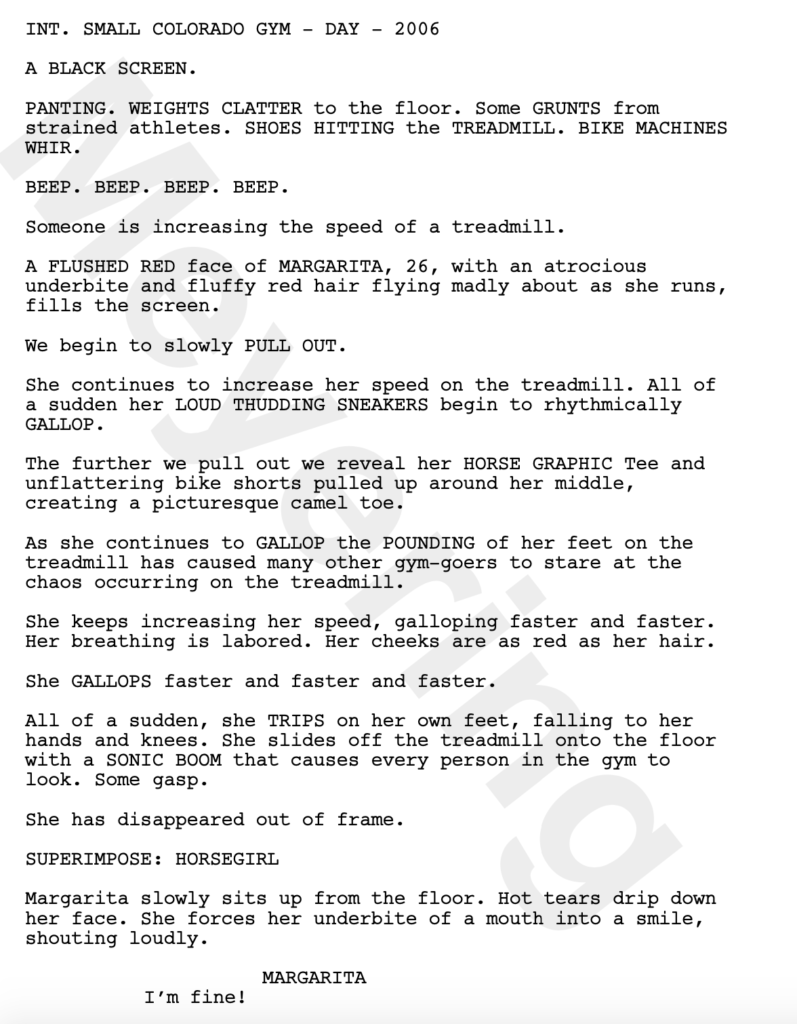
I talk so much about writing strong memorable introductions for heroes yet writers still struggle with it. Most introductions are either bland or boring. If that’s a common problem for you, it might not be that you can’t come up with a good introduction. It might just be that your character is weak. Write a unique character and you’ll find it easier to write a unique introduction.
How awesome is this character? When she rides her bike home from the gym, she sings songs ABOUT HERSELF! Not gonna lie. I’m getting some E.C. vibes here. I could totally imagine E.C. writing a song about himself.
And when she gets home, we get this gem: “She’s fresh out of the shower, hair wet, and in a horse night gown. She interpretive dances as she watches the TV. Her interpretive dancing includes galloping, contemporary, hip-hop, and ninja movements.”
There were so many moments in this script like this that would bring a smile to my face. Who integrates ninja movements into their self-dance sessions, lol???
Margarita is what I call in my upcoming dialogue book, the “highly opinionated socially unaware” character. These characters are amazing for comedies. If you nail them, they can carry the entire script without you needing to do much at all on the plot side. We just want to follow and listen to this weird character, regardless of what she does.
I was enjoying Margarita so much that I was bummed out about the cancer storyline. It’s indie to the indieth degree. Why can’t she just be a normal mother? Not a cancer mother? It’s not like there isn’t enough for her to deal with already. She has to take care of a girl who will never grow up. There’s a scene in the middle of the script where Sandy has to take Margarita to the doctor and in order to avoid a shot, Margarita hides underneath the table and refuses to come out. Sandy just stares at her, embarrassed, with no idea what to do.
That’s a lot of stress right there. Do we really ALSO need a cancer story?
[SPOILERS FOLLOW]
And then Sandy gets the call from her doctor that the chemo isn’t working. That she must accept what’s coming. And Sandy is terrified to tell Margarita. Margarita is a special girl as it is. She has no idea how to even broach the subject with her.
That’s when I realized the genius of the cancer storyline. The best screenplays take your emotions on a roller coaster ride. They don’t hit one monotonous emotional beat over and over again. They take you up high then pull you down low then shoot you right back up high again. What this strategy does is it loosens up your emotional state. You become more susceptible to the heartbeat of the story because all of your defenses are down.
And there was something particularly effective about juxtaposing the wild Napoleon Dynamite-esque adventures of Margarita against something as tragic as cancer. It really hit me hard in a way that I wasn’t expecting at all.
I’ll tell you, also, when this script went from a “double-worth-the-read” to the elusive “impressive” for me. Major Spoiler here, by the way. They kill off the mom BEFORE the final hobbyhorse competition. If that doesn’t happen and the mom, instead, attends the hobbyhorse competition? And THEN dies? This is a b.s. Hollywood script. It’s manipulative. It’s desperate for your tears. For those reasons, it wouldn’t have worked. The mom dying the night before, Margarita still going to the composition, and competing without her mom watching her – that turbo-charged the emotion in the scene, multiplying it a hundred-fold. It was 1000% the perfect creative choice.
I’m still a bit shocked by this reading experience. The script lures you in with this funny weird character. But then it takes advantage of that and brings you into a much more complex story that’s not easy to get through at times, yet is so rewarding when it’s all said and done.
This is not going to be for everyone. But for those of you writing character pieces or anything that has an intense emotional through-line, you need to memorize every page of this script. This is how you get it done. Excellent work by the writer. If anybody knows Lauren Meyering, e-mail me at carsonreeves1@gmail.com. I would love to interview her and learn about her process for creating characters.
P.S. Who in the world would play this character? Any ideas???
Script Link: Horsegirl
[ ] What the hell did I just read?
[ ] wasn’t for me
[ ] worth the read
[x] impressive
[ ] genius
What I learned: This script reminded me of the value of juxtaposing emotional extremes. Ping-ponging between ‘insanely wild’ and ‘incredibly deep’ loosen ups your emotional state and makes you more vulnerable to the emotional beats in the story. I am not afraid to admit that I was sniffling up a storm during that final dance.
Genre: Comedy
Premise: A stoner comedy about one family trying to save Christmas from itself after Santa eats the wrong batch of cookies.
About: This script finished with 9 votes on the 2019 Black List. Writer Dreux Moreland is new to the game. Co-writer Hannah Mescon was a producer on the Adam Driver movie, The Report.
Writers: Dreux Moreland & Hannah Mescon
Details: 108 pages

As tempting as it was to publish a “Why You Are Drinking Too Much Blue Milk” rebuttal article after yet another commenter incorrectly labeled Andor a good show, cooler heads prevailed and I decided to, as the great X-Wing pilot, Jek Porkins, once said, “Stay on target.”
And so a Christmas script it is!
Tom and Leah Mercer are a rich suburban couple. She’s a Type A lawyer. He grew up on a WACO like commune. Bit of a weird choice there since it has nothing to do with the story but, no worries, I’m going to roll with it. They’ve got two daughters, one 7, the other 17. Leah also has a sister, Sasha, who frolics into town. Sasha is the family black sheep and cares more about 4:20 than 4 Calling Birds.
It’s Christmas Eve and Sasha bakes some pot cookies that Tom and Leah snarf down. Then, while they’re in the other room, Santa shows up and likewise stuffs some baked sugar yumminess into his gullet. He instantly becomes very high. After first encountering this assumed Santa imposter, Tom and Leah eventually realize that he really is Santa, and he’s way too high. Which means if they don’t deliver presents in his stead, Christmas is canceled.
Just to be clear – and I’m doing this more for myself – talking through it. Santa, the guy who’s been delivering presents for 600 years is very high. Tom and Leah, who have never delivered a present in their lives, are equally high. Yet Tom and Leah are the ones being counted on to save Christmas. Okay, got it!
So the three of them climb up on their roof, get in the sleigh, and proceed to fly to a single house, go inside to deliver the presents, only to get yelled at by one of comedy’s favorite knee-slappers, the swearing parrot, which says things like, “Little b**ch!” as loud as it can. Cause why wouldn’t the talking parrot swear? It’s a comedy. Wackiness rules!!
After this delivery failure, Santa gets the munchies and decides to take everyone to Miami because he wants a Cubano sandwich. When the Elf team back at North Pole 1 hear of this, they assume he’s been kidnapped by the Mercers and spring into action to locate Santa and get him back on track.
Luckily, with this version of Santa Claus, Santa doesn’t actually have to do anything. He has drones that fly down into houses and deliver the presents, as well as retrieve cookies for him. So it looks like, even though Santa is high as heck, that Christmas is going to end up okay. Hallelujah!
I don’t know what it is about screenwriting but when you first get into it, you always want to write a Christmas script. Every single screenwriter I know, me included, has a Christmas movie idea. So I don’t begrudge anyone who writes one. But just as we learn every year why eggnog is so terrible, we learn that writing a Christmas script is no smooth ride down the chimney.
Here’s the big issue with High on Christmas. And it’s a mistake a lot of comedy writers make. You think of this overall wacky idea and assume it’s going to do all the work for you. I mean, how can ‘wacky’ not result in laughs, right? They go together like Nutella and crepes.
But, in my experience, writers rely so heavily on that “wacky = comedy” premise that they don’t do the work necessary to come up with *actual* funny scenarios.
Let’s go back to one of the final great feature comedies in cinema – The Hangover. There is a “wacky” version of The Hangover that could’ve been written. It’s the version 99% of writers would’ve written. You’ve got a group of friends in Vegas for a bachelor party. You simply follow them around as they party all night. There’s so much wackiness to draw from, right?
But the writers of The Hangover made a much more difficult choice. They focused on the day after the wackiness. All of the supposed “easy laughs” were left behind. So then why is that movie better than all the other comedies that have come out since 2000, including this one? Because now the writers actually have to think in order to craft a funny scenario. They can’t just throw Zach Galifianakis on a blackjack table and have him poop himself. They have to craft a plot with a clever series of goals that take our characters through a progression of funny scenarios.
High On Christmas didn’t have that. It had the swearing parrot. If you like swearing parrots, it’s got that. But how many times have I told you this? You want to include comedy THAT CAN ONLY HAPPEN IN YOUR MOVIE. The swearing parrot can be in any movie, ya nutcrackers!
Now, to the writers’ credit, they did have one moment like this. I like that when Santa gets the munchies, he doesn’t just go to 7-11. It’s Santa. He has a device that can take him anywhere in the world. So, flying to buy a Cubano sandwich that you can only get in Miami – that’s much closer to what I expect in a comedy about a high Santa Claus.
But that was basically it on the creativity front.
Drugs, in general, hurt comedies more than help them. Cause all ‘getting high’ really does for comedy is give you one or two scenes where it’s funny watching your characters try to do something normal but they’re way too high to do it. Yeah, that scene is going to funny. And we do get that here. Tom and Leah trying to take selfies when they first see Santa’s sleigh but continually screw it up – it’s kind of funny.
But now what? You still have an hour and forty minutes of movie left to fill. You can’t just keep doing that joke over and over again.
I don’t mean to be the Grinch but… you gotta come correct here. The characters may be high. But that doesn’t mean you get to write the script high.
LEAH: Tom, I need you to get on my level. That degenerate licking the cookie jar is not Santa.
TOM: But what if he is? He coughed up glitter.
LEAH: So did I at that Bowie concert — and I’m not Santa.
What does this joke even mean?? Do David Bowie’s concerts have a lot of glitter in them? Even if for some reason they do – and I don’t think they do – but let’s say that’s the case. How many people have been to a David Bowie concert and therefore would know that? .0000000001% of the population? So you’re writing jokes for .0000000001% of the population now?
I’m shaking my head here. There’s nothing more frustrating than reading a comedy that doesn’t make you laugh. You get angrier and angrier as you go on. Which is silly, of course. But there’s a deal that’s made between the comedy writer and the reader and that is: you make us laugh. You renege on that deal and we will turn on you m**herf**er. When we don’t laugh, each page feels like a minute of time being ripped out of our life.
The script is also another tonal mismatch. They’ve got the same SEAL-TEAM Elves from the movie, The Santa Clause, but the script also contains lines like, “What a dumb f**king name.” So, is this written for small children or grown adults? I’m confused.
I want to push out good holiday vibes as we move towards Christmas. But we need better Christmas scripts than this if I’m going to do that. This feels like two people got high, wrote a script in a week, and people giggled at the logline and therefore voted it onto the Black List.
[ ] What the hell did I just read?
[x] wasn’t for me
[ ] worth the read
[ ] impressive
[ ] genius
What I learned: The Black List celebrates one or two Christmas scripts a year, regardless of how good they are. That’s because they’re voting on December 11th every year. So Christmas is hot on everyone’s mind. In other words, if you write a Christmas script, go out with it in the month of December.

GALE by Taylor Hamilton!
Congratulations to Taylor. I’ll be reviewing his script on Friday. You can read the script yourself here.
I noticed frustration in the comments from some of you about the concepts that were picked. I understand where you’re coming from. But something you have to keep in mind is that everyone submitting here is, basically, an amateur screenwriter. And when you have strictly amateurs submitting, you’re not going to get a lot of world-beating loglines. That’s just the facts.
I wish it wasn’t. But there’s clearly a process writers need to go through in order to understand what a good idea looks like. Part of that process is simply sending out all those early script ideas, not getting requests, and realizing that the bar is higher than you thought it was.
Another part of it is that we all have a personal attachment to our ideas that clouds our ability to see them objectively. That confuses us when other loglines, which we feel are inferior, get chosen above ours.
A third component is coming up with an actual story to go along with your idea. You have to come up with the central conflict. You have to come up with a strong way into your idea. This is what fleshes your idea out into a full-fledged story.
Once you get better at these things, you start to come up with better ideas. It’s not surprising to me that the script that finished with the second highest number of votes comes from a writer who’s had the script optioned by a legit company. That “pro” perspective was a big reason he was able to come up with the idea in the first place.
The truth is, with all of the entries I received, Gale and Weekend Warriors were the only ones that had the trifecta. They could be classified as “high concept,” they were actually good ideas, and the construction of the logline was professional. Every single other entry had problems in one, two, or all three of these areas.
Let’s take a popular entry from our very own Mister Laurie. A few of you were surprised his script, Call of Judy, didn’t make the top 5. Full disclosure, his script did make the top 10. So it still did really well. It made the top 2%. It just didn’t make the top 1%.
For me, Call of Judy’s biggest strength was its title. However, the further I went into the logline, away from that title, the less interested I became. And that’s not good. It needs to be the opposite. The title should get you excited. And then the logline should get you even more excited.
“When a shy, chubby console kid wins first play of a wild, new VR-games machine but gets lost in its digital limbo, his Xbox-phobic single Mom stumbles to the rescue by completing four videogames designed just for him.”
Let’s take a look at this. First of all, it’s too long. Why does “too long” matter? It denotes a writer who overwrites. That’s been my experience when I’ve opened up these scripts. Not a script-killer. But a red flag. From there, I don’t like the term “console kid.” It’s a weird way of saying a kid who plays video games. I don’t like the term, “digital limbo” either. It’s too vague. You don’t want vagueness in loglines.
But the absolute killer was the last part. “…by completing four videogames designed just for him.” It’s not an interesting enough exploration of the concept, for one. What’s interesting about the mom having to complete video games for her son? It would be more interesting if she had to complete four video games created *by* her son. But even that doesn’t feel like enough. And why “four” video games? Feels like too much. Jumanji didn’t have four video games. They were just sent into a video game and had to get out. It was simple.
That’s what I feared when I read this logline. I feared an overwritten script that’s not going to be simple. And that’s why I didn’t pick it.
I would go with something more like this:
“When a shy kid gets stuck in a new virtual reality game, the only person who can save him is his mother, who’s never played a video game in her life.”
It’s not perfect but notice how much cleaner it is. Notice how you immediately understand the movie. Whereas in the original logline, you’re sort of squinting and reading it twice, trying to make sure you understand all the parts. You eventually figure it out, but not without straining. And that can never be the case with loglines. The reader should never ever strain to understand them. Even a little bit. If they do, your logline is toast. People don’t care enough to figure out a problem that you created. They expect you to figure out all the problems yourself, fix them, so that when the product is presented to them, all they have to do is enjoy it.
I want to improve this issue. Cause it’s obviously a problem for a lot of writers. So I’ve decided that in 2023, we’re going to add a new Scriptshadow feature. On the third weekend of every month, I am going to post 5 loglines from submitted screenplays. Not the full scripts. Just the loglines. You guys will then vote on your favorite over the weekend, just like we do with Amateur Showdown. And then, at the end of the following week, I’ll review the winner.
This will give us once a month to really dive into loglines – what hits, what doesn’t, why something works, why it doesn’t. And you’ll also be able to see the resulting scripts from those loglines, which will additionally teach you about concepts and loglines. Because, almost invariably, the problems you see in a logline are present in the script as well.
This will be an ONGOING submission process. You can submit your script any time of the year you want. And your script will then be in the running for the logline showdown that month. Even scripts that didn’t make the cut for this past showdown could pop up in the January Logline Showdown. So, definitely something to look forward to!
Also, before I go, one quick movie suggestion for everyone. Watch Stutz on Netflix. If you’re anything like me, you had no interest in this doc that Jonah Hill made about his therapist. But someone recommended it to me and it turns out that this therapist is amazing. What I particularly liked about him was that he has keen insight into the battle artists go through and he’s come up with some amazing concepts to combat those internal struggles all artists deal with.
One of his concepts I loved was something called the “string of pearls.” And it essentially addresses the artist’s need to do everything all at once. Write the script (for writers), make the movie (for directors), produce the movie (for producers) – and how we, as artists, get so lost in achieving the big final product that we become overwhelmed and end up doing nothing instead.
“String of pearls” recommends that all you need to do is add the next pearl. Just focus on adding the next pearl. Not the 50 pearls after that one. Just focus on the next one. That’s all you can do. And, eventually, you’ll have a necklace.
He also talks about something called Part X, which is that part of yourself that tells you you can’t do it. It was illuminating when he pointed out that every single person has this. And it never goes away. But there are ways to manage the Part X so it doesn’t sabotage you.
On top of that, you get this secondary storyline of Jonah Hill’s struggles when he was at the height of his fame and battled depression (mainly having to do with his weight) and how this guy basically saved his life. If you’re in a rut right now, this is a great watch. It will inspire you. It will teach you. It’s sort of the perfect motivator to get you in the right artistic head space going into 2023.
See you guys tomorrow!
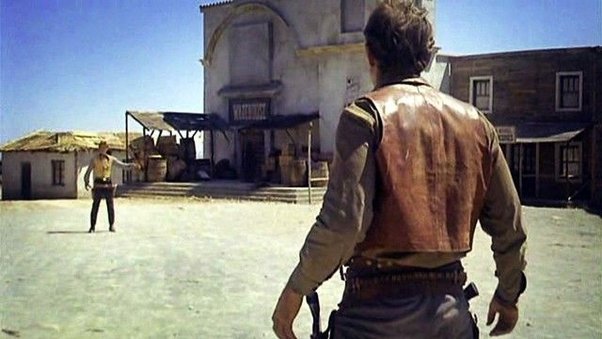
One of my favorite things while going through the entries of these showdowns is writers who try to hide multiple entries by sending them in under different e-mail addresses, but they use THE EXACT SAME FORMATTING as their other e-mail, making it obvious it’s the same person. I love that. Especially because there’s no limit to how many entries you can submit.
As always, it was fun reading through all the submissions. The main two reasons scripts didn’t make it was that the ideas weren’t high concept enough or the ideas were just messy. For example, I’d get stuff like, “A married couple trying to defeat a demon get stuck on a plane with a bomb on it.”
The most bizarre entry I got was a body-swap movie between Vince Vaughn and Chuck Schumer. The writer said their inspiration was they were listening to an interview with Chuck Schumer but thought they heard him introduced as Vince Vaughn, so they decided to write a body-swap movie about Chuck Schumer and Vince Vaughn. Hey! Who knows? Maybe it was great. A little too weird for High Concept Showdown though.
Every once in a while, I’d see a submission that would make me smile. It wasn’t quite right for the showdown. But it’d be creative. Here’s an example: “Simultaneously, across the world, everyone’s feet get stuck in place – trapping them to the circumstances of that moment. This is the story of the people in and around Toronto, Canada, as they navigate this unprecedented event.”
There were a lot of loglines that could’ve used consultations. I’m not just saying that because I offer them. But, seriously, a lot of you guys are majorly handicapping yourselves going out there with these loglines. They’re overwritten, or messy, or the first half doesn’t match the second half. It’s a huge problem that you have to figure out.
I’d say that 90% of the entries were out of the running just because their loglines were messy. As always, feel free to post your logline if you think your submission is better than what’s been posted. If you get overwhelming support from the community, I may just add your script to the mix on-the-fly. That’s how we do it here on Showdown weekend!
Of course, if you want it straight from the horse’s mouth, you can order a logline consult ($25), and I’ll give you a logline evaluation where I tell you what’s wrong with the concept, as well as the logline. And you get a logline rewrite. E-mail me carsonreeves1@gmail.com if interested.
And with that, it’s time!
Read as much of each script as you can, then VOTE FOR YOUR FAVORITE in the comment section. To do that, write a comment with the title of the script you like best. Every writer here would love it if you explained what you liked about their script. And you can also share what you didn’t like about the others.
But the key is, VOTE. Voting ends at 11:59pm Pacific Time Sunday. Whoever gets the most votes gets a review next Friday!!!
GOOD LUCK EVERYBODY!!!!!!
Title: The Castle
Genre: SciFi
Logline: In 1209, a reluctant German crown princess must defend her castle against a brutal group of bandits, consisting of special forces soldiers from the 21st century.
Why you should read: The Castle started as a first act contender and it did advance into the next round. In the last months I had time to finish and polish it, and so I will now throw it into the wild arena that is the amateur showdown.
Why Carson chose it: I remember reading the first 10 pages of this in the First Act Contest (which I will finish after the Dialogue Book!) and really liked them. And it’s just a big idea.
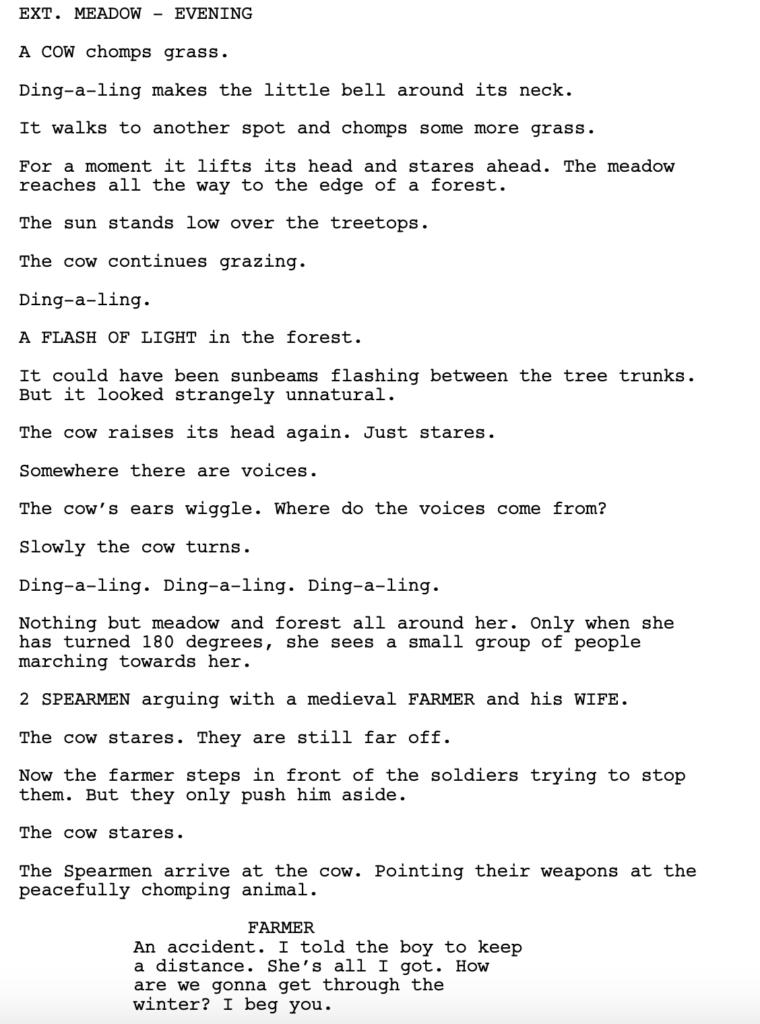
Title: Weekend Warriors
Genre: Action-Comedy
Logline: After a mysterious overnight event turns humanity into hordes of mindless violent drones, two hard-partying office rivals—still inebriated from the evening before—discover that the drugs and alcohol in their systems are the very things preventing them from becoming infected; the only way to stay alive long enough to save mankind will be to party like it’s the end of the world.
Why you should read: This drug-fueled blitzkrieg of a script was optioned in early 2020 by a major production company but died on the covid-coinciding vine. The rights are mine once more and I’m hoping a showdown appearance is just what is needed to give this wild ride a second life.
Why Carson chose it: This is a hilarious premise.
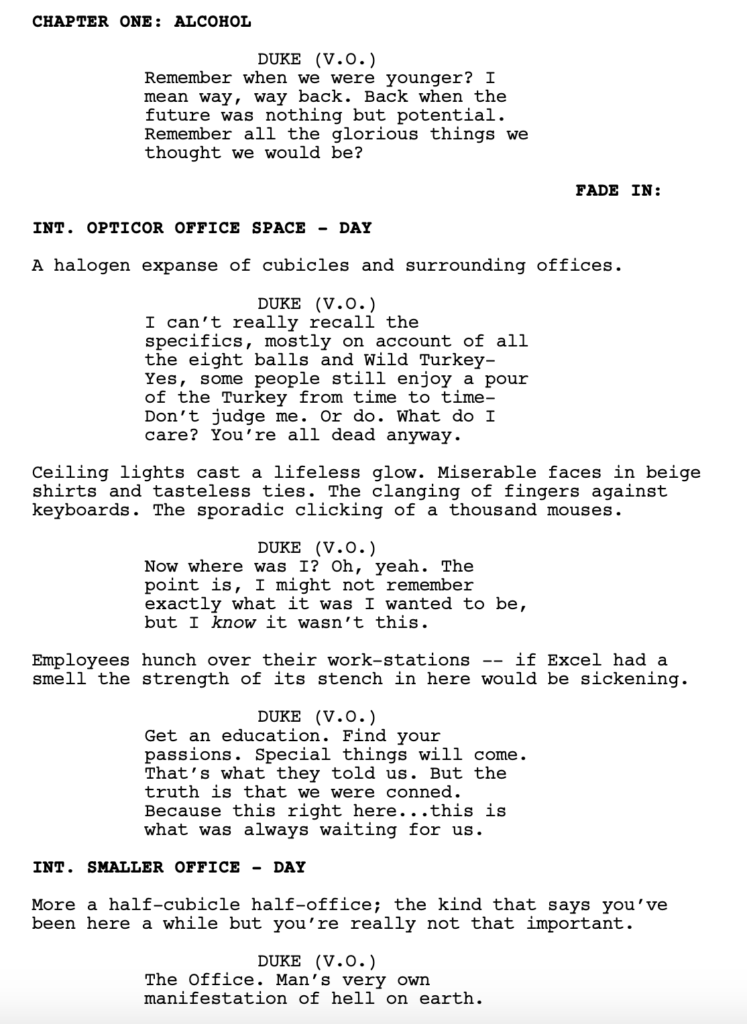
Title: Fleshy: The Selective Slaughter
Genre: Horror
Logline: A gathering of furries find themselves in a fight for survival at an infamously abandoned zoo when one of their own, revealed as anything but an ally, vows to hunt them down like the animals they dress as.
Why you should read: Scary movies have always been seen as a reliable moneymaker, and the box office results for 2022 have only further proven that audiences crave strange and subversive horror. FLESHY: THE SELECTIVE SLAUGHTER flips the classic slasher formula (in this script, the killer is the only one NOT wearing a mask) and, through the terror of a targeted hate crime, aims to shine a light on an underrepresented subculture while also telling a story about staying true to yourself which all audiences can relate to.
Why Carson chose it: I’m always looking for that one offbeat unique idea to feature in these showdowns and this one fit the bill. I’m hoping for the next “Fatties.”
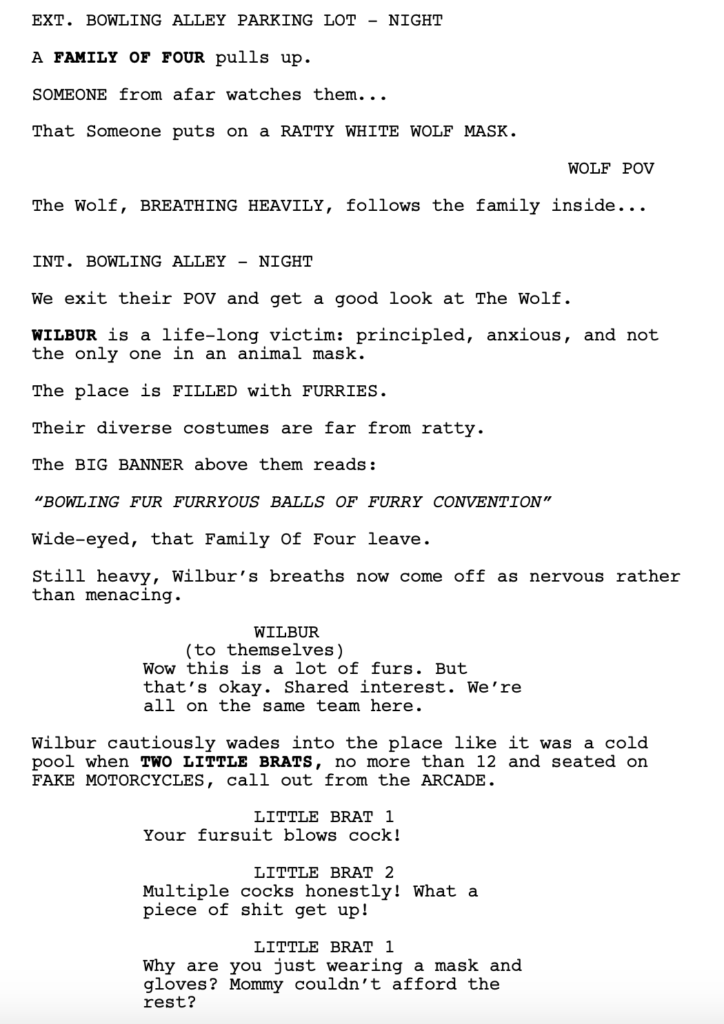
Title: The Burning Ones
Genre: Supernatural Thriller/Horror
Logline: Long thought to have disbanded in the 14th century, a secret order of Templar Knights operate in the modern age, hunting down the Seraphim, GOD’s fallen warrior angels who have chosen to join the forces of darkness.
Why you should read: This is the perfect mashup of action, adventure, and horror. 3 genres that bring every demographic to the theatre and will fill seats. Angels, Demons, Warriors, and Soldiers, as well as a child who may be humanity’s savior… or it’s doom. IT HAS IT ALL CARSON! That’s why you should click open and dive in!
Why Carson chose it: I wanted one entry that felt like a big fun action movie.

Title: GALE
Genre : Action – Thriller
Logline : When a violent, North Pacific storm traps two turbine techs on an offshore windmill, they must weather the storm overnight in order to survive.
Why you should read : Disaster films are tried-and-true blockbusters which always allure an international crowd. Now, let’s contain the threats of that disaster around a monstrous, yet claustrophobic structure that’s never been featured in a studio film. This location is susceptible to fires, explosions, destruction, and other electrifying outbursts that will make any action director salivate at the opportunity to get behind the camera. With a main cast of two, trapped in a battle between human nature versus mother nature, including hints of acrophobia, the most common fear, this movie will have any audience on the edge of their seats. GALE is an action-packed screenplay pitched as “Gravity on an offshore windmill”.
Why Carson chose it: This is right up my alley as an idea. It’s got everything I like in a spec script and a budget-friendly marketable movie in it.
